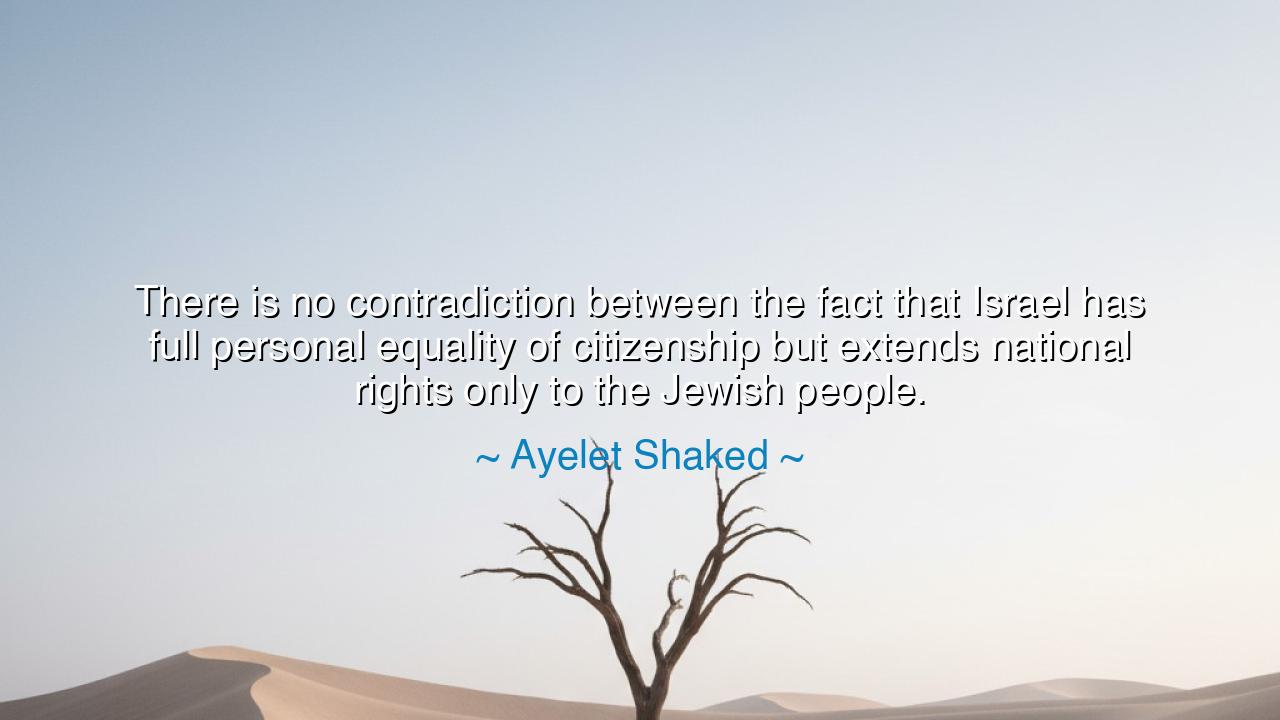
There is no contradiction between the fact that Israel has full
There is no contradiction between the fact that Israel has full personal equality of citizenship but extends national rights only to the Jewish people.






In the firm and controversial words of Ayelet Shaked, we encounter a declaration that reverberates with both conviction and complexity: “There is no contradiction between the fact that Israel has full personal equality of citizenship but extends national rights only to the Jewish people.” These words, spoken by a stateswoman deeply rooted in the soil of her nation’s struggle, embody the eternal tension between individual equality and national identity. They call us to examine how a people may balance the universality of rights with the particularity of belonging, how a nation may open its gates to all as citizens yet preserve its ancient covenant as a people chosen by history and bound by destiny.
The origin of this quote lies in the long and turbulent story of Israel, a nation born from the ashes of exile and persecution, yet built upon the yearning for self-determination. Shaked, an Israeli politician and jurist, uttered these words in defense of the Nation-State Law of 2018, which defined Israel as the homeland of the Jewish people. Her statement sought to affirm that a state can extend personal equality—freedom, dignity, and protection under law—to all its citizens, including Jews, Arabs, Christians, and Druze, while reserving national identity—the symbols, language, and collective purpose—for one people. Her claim, bold and precise, insists that universal rights and national character need not destroy each other, but may coexist if guided by justice and restraint.
At its heart, this idea is not new. Throughout history, civilizations have wrestled with the balance between citizenship and nationhood, between the shared human condition and the sacred identity of tribe, culture, or faith. The Romans, too, once granted citizenship across their vast empire while preserving Rome’s central authority and cultural pride. In India, the spiritual mosaic of many religions still rests upon the frame of an ancient civilization that calls itself Bharat, the land of an enduring cultural soul. Likewise, Shaked’s vision declares that Israel’s identity as a Jewish state is not a denial of others’ equality, but an affirmation of the spiritual promise that gave rise to the nation’s birth. To her, to remove the Jewish heart from Israel would be to extinguish its very soul.
And yet, these words stir unease, for they confront the paradox of democracy itself. How can a nation claim equality while privileging one identity over another? To those who hear in her statement an echo of exclusion, Shaked’s words seem a dangerous narrowing of freedom. But to others, they sound as a defense of cultural survival in a world quick to dissolve the distinctiveness of peoples. Herein lies the ancient dilemma of pluralism: to protect one’s uniqueness without oppressing another’s; to maintain identity without succumbing to superiority. It is a question as old as kingdoms and as fresh as the dawn.
Consider the story of ancient Athens, cradle of democracy and philosophy. There, citizens were granted equality under law—but that equality did not extend to slaves or foreigners. Their democracy, for all its brilliance, was rooted in a specific identity, a shared Athenian spirit that excluded others. Over time, this exclusivity became both their strength and their undoing. For as their empire expanded, the boundary between citizen and outsider grew thin and fragile. The lesson of Athens echoes through Shaked’s words: that identity without openness breeds tyranny, yet openness without identity breeds chaos. A balance must be found between the universal and the particular, between the ideal and the real.
To understand Shaked’s view with fairness, one must hear it not as arrogance, but as fear—the fear of losing a homeland hard-won after centuries of dispersion and sorrow. For Israel, surrounded by hostility, its very existence has been a question of survival. To her, preserving Jewish national rights is not exclusion, but continuity; not supremacy, but preservation. It is a vow whispered through generations: Never again shall we be strangers in the world we built with our own hands. Her words are thus both a defense and a plea—to guard identity without cruelty, to cherish belonging without domination.
And yet, her statement also offers a challenge to the world: can nations learn to define themselves without denying others? Can the flame of identity burn bright without consuming the dignity of all who dwell within its light? The answer lies not in laws alone, but in the hearts of people—whether they choose pride over compassion, or harmony over fear. Equality must live not only in the courts of justice but in the quiet acts of neighborly kindness, in the respect that binds communities together despite their differences.
So let this teaching, drawn from the storm of history, be remembered: identity and equality are not enemies, but partners in the dance of civilization. A nation without equality becomes cruel; a nation without identity becomes hollow. To walk the narrow bridge between them requires wisdom, humility, and love for all who share the land. As Ayelet Shaked reminds us, every people must find its own balance between the soul that defines it and the justice that sustains it. And if that balance is kept with mercy and mindfulness, then even in the fiercest of contradictions, the light of coexistence may yet shine.






AAdministratorAdministrator
Welcome, honored guests. Please leave a comment, we will respond soon